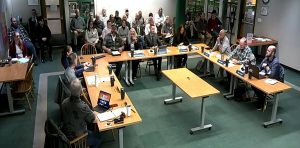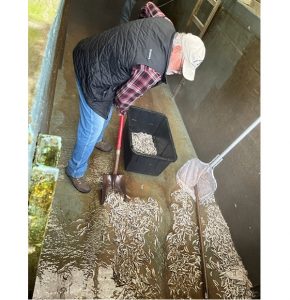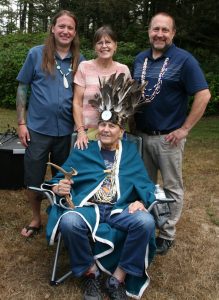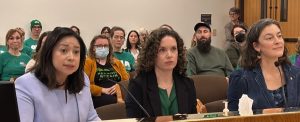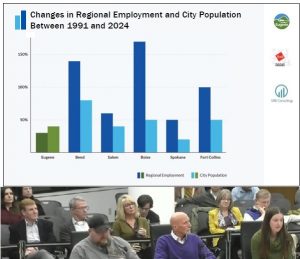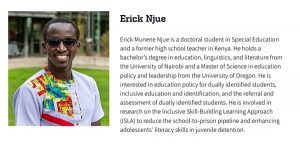Oregon to cooperate on fish and wildlife management with Cow Creek Umpqua
12 min read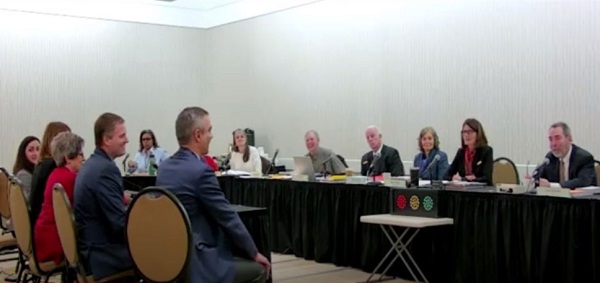
Oregon’s Fish and Wildlife Commission adopts a cooperative management agreement with the Cow Creek Band of Umpqua Tribe of Indians. At the Dec. 16 meeting:
[00:00:10] Davia Palmeri: For the record, I’m Davia Palmeri. I’m the Conservation Policy Coordinator in the director’s office for the Department of Fish and Wildlife. I’m really excited to be bringing this exhibit to you today. Department staff see this as a really incredible opportunity to expand the pace and scale of the habitat restoration that we all know is so critically needed in southwest Oregon.
[00:00:30] Growing our partnership with the Cow Creek Band of Umpqua Tribe of Indians, in addition to the Coquille tribe earlier this year, and hopefully other tribes in the future, is a pathway to improve outcomes for fish and wildlife in southwest Oregon. The tribe has access to more and different resources than the department to influence the ability of Oregon’s lands and water to support fish and wildlife for future generations.
[00:00:51] The agreement that we’re going to talk about today…defines the relationship between the tribe and the department, and is extremely similar to the agreement between the department and the Coquille Indian Tribe that this commission adopted in June.
[00:01:03] But first I want to turn it over to Kelly from the tribe to give you some background on the tribe and their interest in engaging with the department on this work.
[00:01:09] Kelly Coates: Friends, Kelly Coates is my name, and I’m of the Cow Creek people and I’m the director of natural resources for the Cow Creek Band of Umpqua Tribe of Indians.
[00:01:22] First of all, I want to say thank you very much for your time today. We really appreciate it.
[00:01:26] The Cow Creek Band of Umpqua Tribe of Indians is one of nine federally-recognized sovereign tribal governments in the state of Oregon. The Cow Creek Umpqua, or Nahankuotana people, are native to southwestern Oregon and have lived here since time immemorial. Nahankuotana have a deep connection to the land, water, and resources.
[00:01:46] Traditionally, there were abundant resources within our area and the tribe practiced a seasonal subsistence round.
[00:01:52] ‘Manifest destiny’ and Euro-American settlement was a difficult time for our tribe. We did enter into a treaty with the federal government on Sept. 19, 1853. However, pretty much immediately after we entered into the treaty it was largely disregarded. The Rogue River Wars in 1855 and 1856 forced Cow Creek Umpqua people to flee deep in the mountains to avoid extermination.
[00:02:15] And from 1856 until the 1880s, there were repeated efforts by the federal government to capture Cow Creek Umpqua people and exterminate them. Ultimately, we fled into the hills and married into fur-trapping and mining families.
[00:02:29] As I mentioned before, we have a treaty, a ratified treaty that was signed in 1853. After that was a bit of a difficult time in the 1800s for us, but we continued to practice our culture and our lifeways and our community until the Western Oregon Indian Termination Act of 1954, which essentially recognized the tribe as a tribe long enough to un-recognize us as a tribe.
[00:02:52] After that happened there were many people, countless hours working to have our tribe restored and re-recognized. And finally, in 1982, we were federally re-recognized as a tribe. So we just celebrated our 40th anniversary of restoration, which is a big milestone for us. After that, as I mentioned before in the 1853 treaty, it was largely ignored.
[00:03:17] Within that treaty, we were promised reservation lands and goods and services, which never came about. However, after (again) a lot of hard work on the part of our leadership staff and members, in 2018, HR 1306, the Western Oregon Tribal Fairness Act, was passed by Congress, which gave us a portion of our reservation lands back, a little over 17,500 acres.
[00:03:43] And this was a turning point for our tribe in land management. We were finally able to manage the lands that we had managed 150 years ago, and again, we’re able to do that today.
[00:03:54] The Umpqua Tribe is a sovereign nation with its own constitution. It’s governed by an elected 11-member tribal board of directors. We currently have 1,946 enrolled citizens and paramount to our tribe today is our connection to the lands and resources that have sustained our life ways. We are stewards and protectors of the land, and we take this job very seriously.
[00:04:17] Natural resources are considered cultural resources and practicing our traditional lifeways— hunting, fishing, and gathering—are a part of who we are as a people. We also continue to hold ceremonies for our people and our resources.
[00:04:31] Jason Robison: Good morning Chair Wahl, Vice-chair Zarnowitz and Director Melcher. My name is Jason Robison and I’m the land and resource officer for the Cow Creek Band of Umpqua Tribe of Indians.
[00:04:38] As Kelly mentioned, the Cow Creek people have been stewards of the land since time immemorial. We use an integrated approach to management. Integration means bringing all resources to bear to create mutual beneficial outcomes. Oftentimes, we see an interdisciplinary approach, and that interdisciplinary approach oftentimes separates resources into small areas and silos resources.
[00:04:58] The tribe brings an integrated approach to bring those resources together. We believe strongly that restoring and preserving habitat is key to species recovery, and we have a track record of partnering with many conservation groups, members of the public and agencies on how we move forward with habitat restoration and preservation.
[00:05:15] One example of a partnership that we’ve had with the Oregon Department of Fish and Wildlife is our elk study. This was an elk project that has spanned from 2018 to 2022 with a project goal of observing seasonal changes in elk herd behavior, habitat utilization, and population trends. We originally captured 17 elk for this project.
[00:05:33] And we’re still collecting data on 10 elk. Once again, this was a project to allow us to manage populations, track habitat conditions, and provide opportunities for the tribal membership to have a sustainable harvest on tribal lands.
[00:05:45] We continue to practice traditional lifeways today, having an opportunity to practice traditional harvesting on tribal lands. The tribe continues to do that today, and we look forward through this agreement to continue to pass that tradition down to future generations.
[00:06:02] Part of managing the land since time immemorial is practicing traditional practices on that landscape and putting those traditional practices and values back in the landscape. The tribe has stepped up in a major way to partner with many different agencies on a broad scale co-management approach. We have several agreements in place right now with the Umpqua National Forest, and we are working on securing additional agreements with the Bureau of Land Management to provide broad-scale holistic land scale management.
[00:06:27] So we can actually preserve habitats, protect habitats, and create more resilient and healthy forests. Not only are we putting those traditional practices back on the landscape through prescribed fire, but those prescribed fires are providing habitat for deer and elk, that then our tribal members have an opportunity to harvest.
[00:06:42] Kelly Coates: Thanks, Jason. So we talked a little bit about hunting. I’d like to talk a little bit about fishing. Full disclosure, I’m a fish biologist by training, so this is my favorite part.
[00:06:51] The first thing I want to say about our approach to fisheries management is that the tribe takes an all-fish approach to things. I think oftentimes fisheries can become very politicized and can quickly turn into a wild-versus-hatchery issue. That’s not how the tribe approaches fisheries management. For resource conservation, my goal as a fisheries and land manager is to have robust runs of wild fish so we can have a sustainable harvest of those fish and not have to rely on hatcheries.
[00:07:22] Unfortunately, we’re not there yet and we rely on hatchery fish for subsistence fishing and practicing our traditional life ways and an example of this, I’ve been working with Rock Creek Hatchery for a number of years now to obtain hatchery spring Chinook salmon for our salmon ceremony at our culture camp every year. Without these fish, we wouldn’t be able to practice these ceremonies. We cannot lose connection to these fish and our traditional lifeways.
[00:07:53] Part of our connection to the fish is actually fishing for them, subsistence fishing, and as I mentioned before, our ceremonies. We cannot harvest wild fish in many instances, and we do not want to impact the wild populations. We feel that hatchery programs can be a tool, but they need to be managed responsibly to minimize impacts to wild fish, and that’s exactly what we do.
[00:08:17] One example of that Is our South Umpqua winter steelhead acclimation partnership with ODFW and the Umpqua Fishermen’s Association, which is an ODFW-staffed group. The program was created to increase harvest opportunities for anglers within the South Umpqua, create more access to a culturally significant species for our tribal members, allow for subsistence fishing and other cultural purposes, and the partnership has led to an acclimation research study.
[00:08:42] In the fall of 2017, we convened a meeting at the Oregon Hatchery Research Center. We had tribal fisheries managers, ODFW staff, and local partners there. And really, we were talking about the best available science for hatcheries and acclimation.
[00:08:57] From that meeting, we determined that we wanted to do a study of different release strategies for our winter steelhead program in order to find the best strategy that would have the best return rates of fish back to the targeted fishery and decrease stray rates of those hatchery fish.
[00:09:14] We worked cooperatively with ODFW and the tribe, as Davia mentioned, has access to different pots of money than the state does. So we were able to get some funding through the Bureau of Indian Affairs to purchase the coded wire tags for the study. We also contributed in-kind staff time for the project as well.
[00:09:30] Our first release was in 2018. We still have fish coming back this year, and I hope to be able to present some results to the commission at a future meeting.
[00:09:39] In addition to working with ODFW on the Winter Steelhead Program, our staff also help with spawning fish at Cole Rivers Hatchery. The tribe has also worked with Rock Creek Hatchery for a number of years pre-Archie Creek fire, and we continue to work with ODFW staff at Rock Creek Hatchery collecting fish.
[00:09:55] We are also partnering with ODFW to fix the Rock Creek ladder to help decrease the PHOS (Percent of Hatchery-Origin Spawners) on the wild spawning grounds above the Rock Creek ladder by capping the ladder and getting that PHOS level down.
[00:10:10] As I mentioned, the tribe takes an all-fish approach, so we don’t just work on acclimation and hatcheries. We do a lot of stream restoration as well. We partner with state and federal agencies, local nonprofits and watershed councils on stream and riparian restoration projects. We’ve secured over $2 million in grant and foundation funding over the last few years for projects within the Umpqua and Rogue basins.
[00:10:37] The tribe is working with state and federal agencies as well as our local watershed council to do a whole watershed restoration initiative within West Fork Cow Creek, which is a bit of a stronghold for fish in the Umpqua.
[00:10:48] Through that partnership we were able to secure some Pacific Coast Salmon Recovery Fund dollars to not only implement on the ground projects, but also develop a prioritization plan for restoration so we can better determine where to put our resources on the ground, to leverage those resources with our partners to do more work.
[00:11:09] Some of those projects resulted in helicopter log placement, some resulted in cable yarding logs into the stream to create habitat, and one of those resulted in a major culvert replacement. This was a very large culvert. It was perched and it was impeding passage of anadromous fish species and also Oregon Coast coho, an endangered species. We were able to complete this project last summer and now we’ve opened up passage for another two miles of habitat above there. These are just a couple examples of the habitat work that we do.
[00:11:43] And before I move on to the gathering portion of this, my board members and leadership have a joke that I can turn any conversation into one about Pacific lamprey, and I’m going to do that again. . , I wear a number of hats. One of my hats is the tribal co-chair for the Pacific Lamprey Conservation Initiative, and this week we had our Lamprey Summit 5 here in Portland.
[00:12:03] And we were actually lucky enough to have (Deputy Director) Debbie Colbert there and just sign the conservation agreement again on behalf of ODFW. So thank you very much for that.
[00:12:14] But like I said before, we take an all-fish approach and that doesn’t just mean sport fish. That means all native fish, including species like lamprey, which I’ve heard the term ‘underloved’ species and I would definitely agree with that.
[00:12:27] So the work that we do in these restoration projects, while often they’re funded with salmon dollars, we implement projects that will help all native fish, including Pacific lamprey, which are also a culturally significant first food source. So I just want to make it clear that oftentimes salmon money funds the work, but we do the work for all the fish.
[00:12:48] So we talked about hunting and fishing. Let’s talk a little bit about gathering. In 2017, the Broken Lookout Fire burned a large portion of the Rogue-Umpqua divide. And within that area is the is a culturally significant area for our tribe called the Huckleberry Special Interest area, or the SIA.
[00:13:07] After the fire we were contacted by the Rogue River-Siskiyou National Forest botanist who had been out collecting huckleberry seeds within the SIA before the fires broke out. He asked if we were interested in partnering on a project to replant huckleberries within the SIA, and immediately we signed on. We were able to cultivate over 11,000 plants at the Dorena Lake USDA Center, which is amazing, because huckleberries are incredibly difficult to cultivate in a greenhouse setting.
[00:13:36] After the plants were ready, we were able to get them in the ground. We had 37 volunteers ranging from Rogue River-Siskiyou National Forest staff, tribal staff, tribal elders, tribal youth, as well as folks from the Rogue Native Plant Partnership, which was also a partner on the project with us.
[00:13:53] This is also especially meaningful for me on a personal level. My oldest daughter, was I think five at the time—this project was a way for me to really show her how we are stewards of the land and what we do; and if there is a catastrophic event on the land, how we give back to the land, how we help set it on a trajectory for recovery.
[00:14:14] And so being able to go out there and help her understand this and then tie this back to when we go and we harvest huckleberries, which is a first food source, we can talk about this. She understands the full cycle and the reciprocity of our approach to land management. Our first foods give for us and we take care of them, and that is our general approach to things.
[00:14:39] …And I’m going to let my co-presenters introduce themselves.
[00:14:43] Carla Keene (CCBUTI Chairman): Chair Wahl, Commissioners: My name is Carla Keene. I am the chairman of the Cow Creek Band of Umpqua Tribe of Indians.
[00:14:52] Anthony Broadman (CCBUTI General Counsel): Good morning chair, vice-chair, commissioners. My name’s Anthony Broadman. I’m general counsel for the Cow Creek Tribe.
[00:15:00] Curt Melcher (ODFW Director): First I want to thank these folks of course, for coming up and being with us in person. And I (of course) thank Davia for all of her work on this, just keeping this stuff moving and keeping organized. And she is the most organized person in the world, I tell her that on a regular basis.
[00:15:16] But I did also want to say that you know, this is really, this is hard work. It’s really important work though. We know there’s going to be bumps in the road, and I’ve said this , as we are negotiating these agreements, there’s going to be bumps in the road, but we’re committed to working those bumps out as we move forward.
[00:15:32] For me the righting the wrongs is really important, but also for us as we look at the 21st century and the challenges we’re going to face, we are just going to be so grateful to have some really important and influential partners standing with us on issues like Instream water rights, and other anthropogenic habitat modifications that will be coming down and proposals that’ll be coming down the line that it’s just something that we can’t do alone as a Fish and Wildlife agency.
[00:16:01] And this is about giving up some things too. We’re working with them and giving them some shared authority. That’s always challenging. We’re going to have our detractors as we move forward with that. But for the last 150 years, it’s been us saying, ‘It’s our way or the highway.’
[00:16:19] And now we’re saying, ‘No, we’re working together to make this all of ours ways.’ So I just want to thank you for that. And I also wanted to recognize former Chairman Courtney, who’s in the room. A long time—I can’t even remember how long—Dan Courtney was chair of the Cow Creek Band of Umpqua Tribe of Indians.
[00:16:39] But he’s with us here today, choosing to remain silent, but just that his presence did not go unrecognized. So thanks for being here.
[00:16:49] John Q: The cooperative management agreement applies in five counties—all of Douglas, Lane, Jackson, Josephine, and Coos counties.

